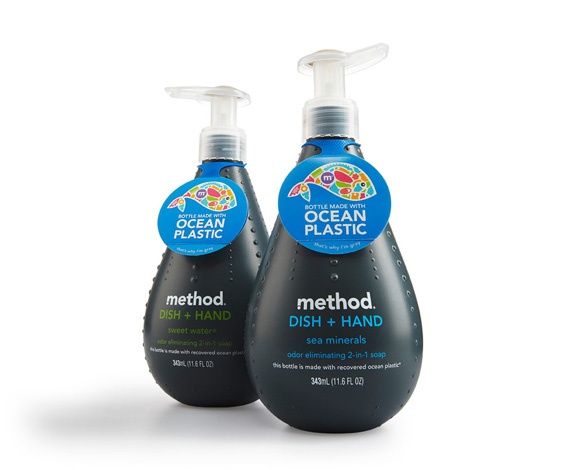
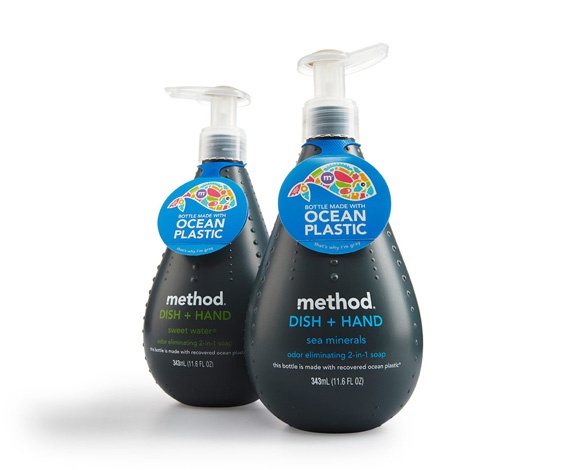
Yesterday was the 40th anniversary of the Clean Water Act, a piece of legislation that the New York Times described as "a critical turning point in the nation’s efforts to rescue its rivers, streams, lakes and wetlands from centuries of industrial, municipal and agricultural pollution."
Consider it good timing then, that Method, the San Francisco-based soap company, just introduced a new product designed to tackle another major water issue, the Great Pacific Garbage Patch. The real story isn't the product though, it's the packaging. The bottle for this hand soap is made partially from plastic that the company collected on beaches in Hawai'i. Method is calling it "Ocean Plastic."
Method partnered with two nonprofit groups, Sustainable Coastlines Hawai’i and Kokua Hawai’i Foundation, to pick up more than 1 ton of beach trash over a period of a year and a half. Method then shipped all that plastic waste back to its packaging partner, Envision Plastics, in California, to be recycled and turned into soap bottles. The product hit Whole Foods shelves last week.
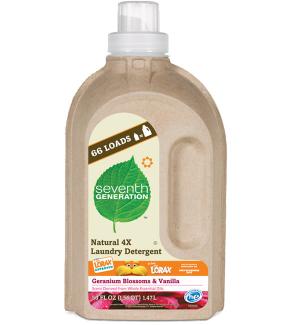 Other companies have also been doing interesting and important things with their packaging, and even their products. For example, last year Seventh Generation created a cardboard "bottle" for its liquid laundry detergent. The recycled cardboard acts as a protective case for a thin plastic bag that actually contains the liquid detergent. Seventh Generation's design used 66% less plastic than other similar-sized laundry detergent bottles. If the description is confusing, think of box wine.
Other companies have also been doing interesting and important things with their packaging, and even their products. For example, last year Seventh Generation created a cardboard "bottle" for its liquid laundry detergent. The recycled cardboard acts as a protective case for a thin plastic bag that actually contains the liquid detergent. Seventh Generation's design used 66% less plastic than other similar-sized laundry detergent bottles. If the description is confusing, think of box wine.
Instead of focusing on packaging, Massachusetts-based Preserve uses 100% recycled materials to make the products themselves. Preserve makes products like toothbrushes, razors, and plastic dishware. Preserve collects much of the material for its products from nearby Stonyfield Farm, which donates the waste resulting from the creation of its yogurt and other food containers.
It's fantastic that innovative companies like Method, Seventh Generation and Preserve continue to push the boundaries of sustainable manufacturing. It's companies like these that lead the way for the rest of the pack.
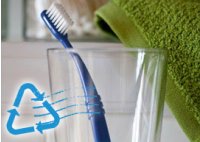 Still, consumers rarely hear the whole story. When we read about Method's beach cleanup efforts, we wondered why the company chose to focus on Hawai'i, necessitating a 2,000 mile shipping operation. Could the environmental benefit from the creation of recycled bottles possibly out-weigh the environmental cost of shipping the trash back to the mainland? What percentage of "ocean plastic" was being used in the bottles? Does Method have a plan to replenish its stocks of "ocean plastic" when the first batch runs out? How much more expensive are these new bottles than the old? Was this a genuine effort to create a sustainable solution or a publicity stunt?
Still, consumers rarely hear the whole story. When we read about Method's beach cleanup efforts, we wondered why the company chose to focus on Hawai'i, necessitating a 2,000 mile shipping operation. Could the environmental benefit from the creation of recycled bottles possibly out-weigh the environmental cost of shipping the trash back to the mainland? What percentage of "ocean plastic" was being used in the bottles? Does Method have a plan to replenish its stocks of "ocean plastic" when the first batch runs out? How much more expensive are these new bottles than the old? Was this a genuine effort to create a sustainable solution or a publicity stunt?
For its part, Method never claimed that it would fix the world with just one bottle. Here's Method's co-founder, Adam Lowry: "The point, of course, is not to clean up the Gyre [the floating garbage patch]. The scientists who study this problem will tell you there is no practical way to clean it up; the area is just too remote, and the plastic too small. The goal is to raise awareness about the issue of plastic pollution, and to point us toward the solution already in front of us – using the plastic that’s already on the planet. That way, more people will ask for it, and more manufacturers will make it."
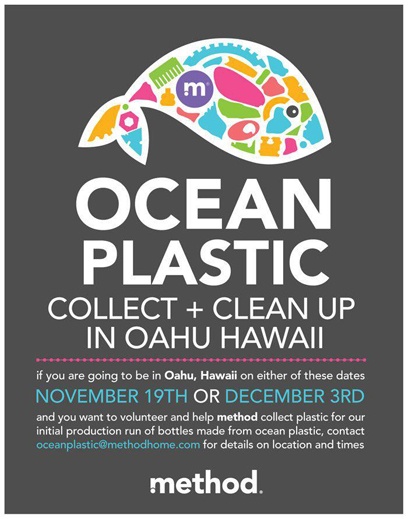 Many "dark greens" might argue that without detailed and transparent environmental reporting, the effort falls flat. However, raising awareness is a crucial part of attacking every serious issue. Without broad awareness and education, no one will care enough to do anything about the problem. For its "Ocean Plastic" soap, Method has done an excellent job of supporting the product release with a dedicated website, a strong retail partnership, high-quality multimedia, and coverage in all corners of the internet.
Many "dark greens" might argue that without detailed and transparent environmental reporting, the effort falls flat. However, raising awareness is a crucial part of attacking every serious issue. Without broad awareness and education, no one will care enough to do anything about the problem. For its "Ocean Plastic" soap, Method has done an excellent job of supporting the product release with a dedicated website, a strong retail partnership, high-quality multimedia, and coverage in all corners of the internet.
We look forward to hearing more details about this new bottle and recycling process from Method. In the meantime, more brands should consider creative ways to change their standard operating procedures for the better, if only for just one product. Meaningful innovation starts with small actions. Adopting an issue, as Method has done, creates a rich story and can be a powerful way to focus the brand message and energize customers.
